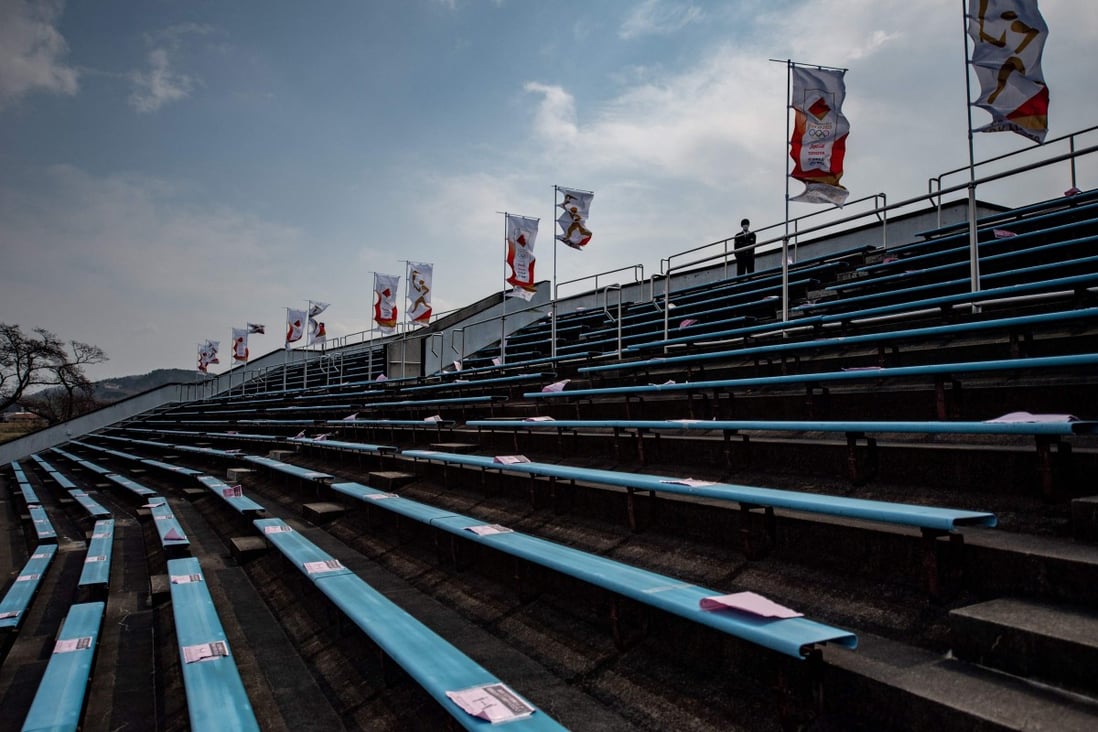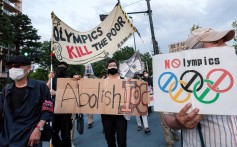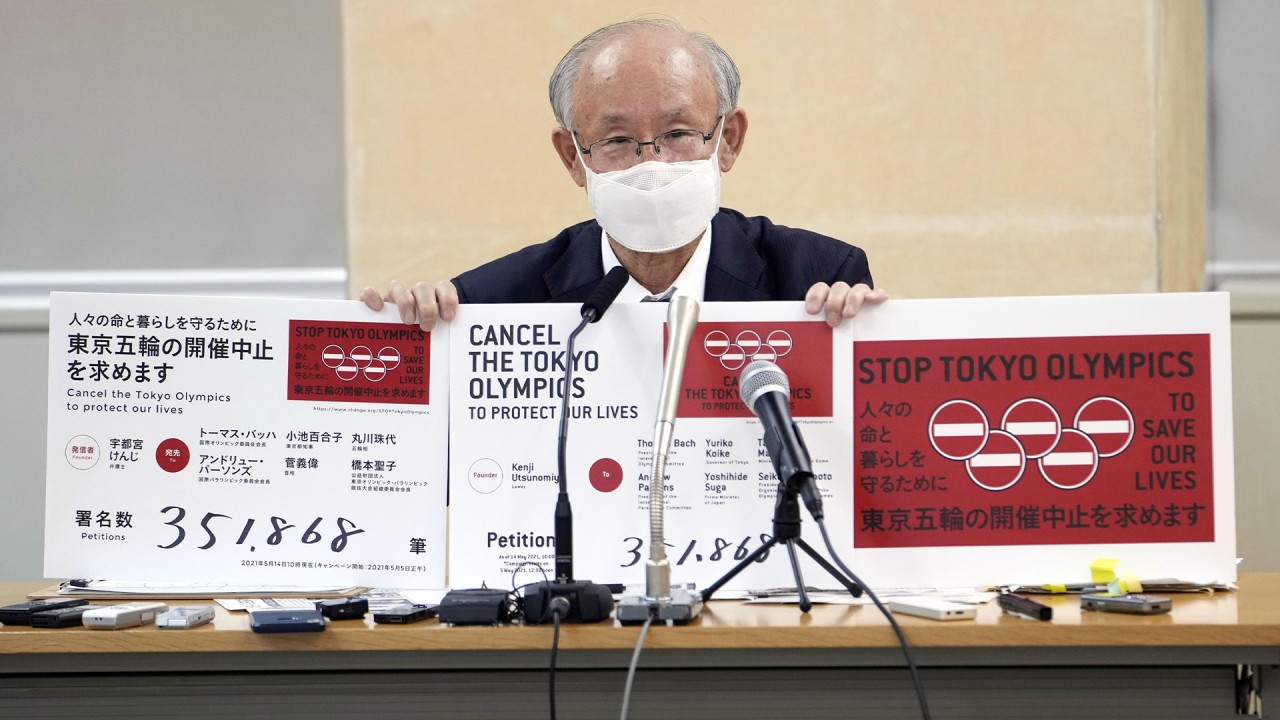Tokyo 2020 organisers have banned foreign fans and will not decide on Japanese fans attending until as late as June
Football and other sports have ploughed on with seasons in empty stadiums but one-off Olympics feels different
Published: 18 May, 2021

Social distancing signs are pictured on grandstand seats during a ceremony on the second day of the Tokyo 2020 Olympic Games torch relay at Shinobugaoka Stadium in Fukushima on March 26, 2021. Photo: AFP
“Football without the fans is nothing” is the message on the statue of legendary manager Jock Stein at Celtic Park.
It’s a sentiment that football fans have got behind in recent years as consumerism has gripped the game with hand-painted banners bearing the message appearing at Liverpool’s Anfield, Arsenal’s Emirates Stadium and Leicester City’s King Power Stadium among clubs in the English Premier League.
It’s a message that translates internationally, too. “Fussball ohne fans ist nichts!” as the German fans had it in the Bundesliga game between Borussia Monchengladbach and Wolfsburg last June.
That banner was draped over a stand that was filled with cardboard cut-outs of fans at Borussia Park, with the Covid-19 pandemic preventing them from attending.
Aside from becoming the battle cry against consumerism, the pandemic has given Stein’s sentiment a more literal meaning in these months of empty stadiums.
Take Manchester United where an official club banner stating “Football is nothing without fans,” apocryphally attributed to former boss – and Stein’s fellow Scot – Matt Busby, adorns the barren stands at Old Trafford.
Why Tokyo thinks its Olympics show must go on – even as Covid-19 booms
16 May 2021

While it might not be nothing, football is certainly not the same without the fans. Not in the slightest.
It has been bemoaned by fans, media, players and coaches alike – the missing spark in derby matches devoid of atmosphere, the lack of tension as teams chase games with time ticking down, the absence of home advantage.
We might well be getting used to football in empty stadiums but everyone wants fans back in stadiums as soon as is safe to add to the sporting spectacle.

01:25
Anti-Olympics protesters petition to cancel Tokyo games
If fans are important to the world game then we will soon see how they are even more important to the only sporting event that is more global: the Olympics.
We knew in March that there will be no foreign fans in attendance at the delayed
Tokyo 2020 Olympic Games this summer – and they will no doubt be the poorer for it.
It remains to be seen whether even Japanese fans will be permitted.
That was meant to be decided last month but Games organisers have reserved the right to make that decision and on stadium capacity as late as June.
Public opinion wants fans to stay away – with an opinion poll by the Yomiuri daily last weekend saying only 39 per cent of the public want the Games to go ahead at all and 23 per cent want there to be no spectators if they do.
The original playbook already hinted at an unusual Olympics, with fans urged to “support athletes by clapping and not singing or chanting”.
It is sad for the athletes looking forward to the zenith of their sporting careers.
How are they meant to go faster, higher, stronger without the encouragement – or indeed booing as seen at Rio 2016 – of fans in the stadiums?
What is a long jump without the fans clapping in unison ahead of a final attempt? What is the 100m final without tens of thousands of fans’ collective intake of breath? What is any world record attempt without the moment everyone in the crowd realises it is on course and starts willing it to happen with their cheers?
Man United and Liverpool fans overseas can fight back against football’s greedy owners
14 May 2021

It is a key part of the theatre of sport, both for those competing and as much if not more for those watching in the stands and at home.
Some times it doesn’t add to the narrative so much as creates it, with booing more than cheering.
Therein lies the tale of the underdog, such as Rio fans booing Spain and cheering Croatia in the men’s basketball group game or Athens fans booing Paraguay and cheering on Iraq in the men’s football semi-final.
No singing and chanting, Covid-19 rules unveiled for delayed Tokyo Olympics
It is also this narrative building which saw the Russians booed in Rio after state-sanctioned doping, with the fans coming down harder on them than the International Olympic Committee.
Then there’s the booing of judges for not agreeing with the fans.
It’s happened often but never more so than in Athens in 2004 where booing fans held up the men’s horizontal bars final for nearly 10 minutes after 2000 gold medallist Alexei Nemov was scored too low for a daring routine. That he was a Russian shows how these narratives can change between Games.
If there are no fans at all in attendance, as is being mooted, then there will have to be measures to make this Olympics less muted.
Other sports have wrestled with this for both the players and the television audience.
Cardboard cut-outs of fans have been widespread across the sporting world while La Liga’s broadcasts featured a virtual crowd projected on to the empty stands. Japan even had robot fans at the baseball.
There have been plenty of experiments with piping crowd noise into the stadium or on to the audio for television but it is not the same as a live crowd.
Yet another reason why this might be the most lifeless Olympics yet and while the Games might go ahead they will do so without the fun.
No comments:
Post a Comment